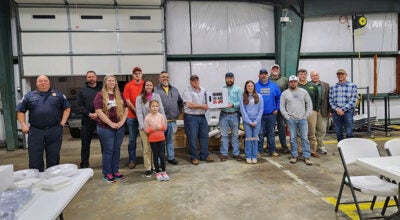Explainer: What can, and can’t, Isle of Wight do with its opioid settlement money?
Published 8:36 pm Friday, December 2, 2022
|
Getting your Trinity Audio player ready...
|
Isle of Wight County supervisors are mulling potential uses for the roughly $416,000 the locality expects to receive from an opioid lawsuit settlement over the next 18 years – a total that will likely increase as additional drugmakers finalize their agreements with the state.
Former Virginia Attorney General Mark Herring, just prior to leaving office in January, announced that the state would receive $530 million as part of a nationwide $26 billion settlement with drugmaker Johnson & Johnson and distributors AmeriSourceBergen, Cardinal and McKesson.
Opioids, according to the U.S. National Institute on Drug Abuse, are a class of painkiller drugs made from the opium poppy plant or created in labs using the same chemical structure. Opioids include the illegal drug heroin and prescription drugs such as oxycodone and hydrocodone, which can lead to addiction.
Herring had signed Virginia onto several multi-state lawsuits against opioid industry players during his time in office. The cases continued under his successor, Jason Miyares. The lawsuits accused pharmaceutical companies, their consultants and retailers of helping to create, prolong and profit from the opioid addiction epidemic plaguing Virginia and the nation.
Miyares announced in July that Virginia could expect to receive an additional $110 million from combined $6.6 billion nationwide settlements with opioid drugmakers Allergan and Teva Pharmaceuticals.
Virginia has allotted 30% of its share of the pending settlements for direct aid to the state’s 133 counties and cities based on each locality’s population, share of overdose deaths and other factors. Another 15% will stay with the state and the remaining 55% will be given to the new Virginia Opioid Abatement Authority, which will further distribute funds to cities, counties and state agencies.
At a Nov. 17 meeting of Isle of Wight’s Board of Supervisors, County Attorney Bobby Jones informed the board that Isle of Wight has received three payments to date – two totaling just under $29,700 from AmeriSourceBergen, Cardinal and McKesson, plus just under $58,000 from Johnson & Johnson. An Oct. 27 letter to County Administrator Randy Keaton from Anthony McDowell, executive director of the OAA, estimates Isle of Wight could receive just under $389,000 from the three distributors and just under $78,000 from Johnson & Johnson by 2039.
The letter lists an additional $152,811 in OAA-distributed funds on reserve for Isle of Wight through 2039. The county’s first OAA payment, in the amount of $32,136, is slated to be made to Isle of Wight by June 30. The OAA is offering Isle of Wight an additional 25%, or just over $8,000, in 2023, contingent on the county agreeing to what the authority has termed its “gold standard.”
To meet the gold standard, Isle of Wight would have to commit to using its OAA funding to “treat, prevent, or reduce opioid use disorder or the misuse of opioids through evidence-based or evidence-informed methods, programs, or strategies.” The gold standard further requires participating cities and counties to report back to the OAA on their implementation of said strategies, and bars localities from supplanting local funding of an existing program with OAA money.
According to Jones, nine other defendants in Virginia’s remaining opioid lawsuits have reached tentative settlement agreements, from which Isle of Wight can expect to receive a cut.
The county expects a $10,000 share from Ireland-based Mallinckrodt to be paid over eight years. Mallinckrodt, which filed for bankruptcy in 2020, manufactured a generic version of oxycodone. The company has agreed to a $1.7 billion nationwide settlement as part of its Chapter 11 reorganization plan.
Isle of Wight expects an additional $14,000 to be paid over four years from McKinsey & Co., a consultant for Purdue Pharma, which agreed in 2021 to pay $573 million to settle lawsuits in 47 states, Washington, D.C., and five U.S. territories.
Purdue Pharma itself and its Sackler family owners agreed in March to pay a roughly $6 billion settlement to Washington, D.C., and eight states. The Connecticut-based manufacturer of the brand-name painkiller OxyContin has also filed for bankruptcy. Of the $6 billion, Isle of Wight can expect roughly $60,000 over the next 18 years, Jones said.
In August, Endo International agreed to a $450 million settlement over 10 years. The Ireland-based manufacturer of brand-name opioids Percocet and Endocet has also filed for Chapter 11 bankruptcy protection in the U.S. Isle of Wight expects $5,500 as its cut over the same 10-year period, Jones said.
Teva, an Israel-based manufacturer of fentanyl drugs, agreed to a $4.25 billion nationwide settlement in July. Isle of Wight, according to Jones, can expect a $52,000 share over 13 years.
Ireland-based Allergan, which made Norco- and Kadian-branded opioids and was acquired by Abbvie in 2020, reached a tentative $2.37 billion multi-state settlement in July. Isle of Wight, according to Jones, can expect a $28,000 share over six years.
Walmart, Walgreens and CVS, Jones said, have also reached a global settlement in excess of $12 billion, from which Isle of Wight can expect to receive almost $300,000 over “some period of time.”
“What we’re going to receive from the distributors and Janssen,” Jones said, referring to Johnson & Johnson’s Belgium-based pharmaceutical subsidiary, even without the Opioid Abatement Authority funding or pending shares of settlements with other opioid-makers, “is $416,000 over 18 years.”
“It’s money that we need to be thinking about and setting up a process of how this is going to be spent, because it needs to be spent on abatement,” Jones said. “What can this board put it towards that has, for lack of a better term, the biggest bang for your buck.”
What are the spending options?
One option is to give the money to the Western Tidewater Community Services Board, a regional organization that, according to its website, provides a single point of entry for access to mental health services, developmental disabilities support and substance abuse services for Isle of Wight and Southampton counties and the cities of Suffolk and Franklin.
Supervisor William McCarty, however, isn’t in favor of that option.
“They don’t have a very good track record of doing some things; I don’t mind going on record and saying that,” McCarty said.
“There are students that are on opioids in our county,” McCarty said, proposing that Isle of Wight “come up with something cutting-edge … even if it required a little bit more money.”
“To be quite honest, when you think of this little bit of money over this period of time, it’s not a whole lot,” McCarty added. “It’s a big deal in our community. We can’t run from it. We can’t just leave it to the Sheriff’s Department or CSB’s failing policies to be able to embrace it. Something’s got to be done; something’s got to be changed.”
Isle of Wight already partners with Suffolk to fund a regional “drug court,” which moves nonviolent offenses committed by addicted people to a separate docket from regular criminal court. Chief Judge Carl Eason Jr. estimated to the Suffolk News-Herald in 2021 that around 70% of cases coming through the Fifth Judicial Circuit – which encompasses Isle of Wight, Suffolk, Franklin and Southampton – involve drugs, even if they aren’t directly connected to a drug-related crime.
In December of that year, the Fifth Circuit reestablished its drug court. According to the News-Herald, a drug court had previously served Suffolk from about 2004 to 2008 but ended due to lack of funding. Roughly three years ago, public defender Elisabeth Culpepper proposed the idea of restarting Suffolk’s drug court. In 2020, the state’s Drug Treatment Court Advisory Committee gave the drug court its unanimous approval.
Since Isle of Wight already funds the drug court, the county would need to come up with some type of expansion or new angle to meet the gold standard requirement that its opioid settlement money not replace local funding of an existing program.
Jones estimated Isle of Wight’s drug court currently has about 16 participants.
Drug courts were initially formed to keep people off of drugs, Jones said, but “drug court’s position now is keeping people alive long enough to get them off of drugs, because that’s how bad this is.”
Supervisor Dick Grice urged the board to include the Western Tidewater Free Clinic in its discussions. The county already contributes some funding to the clinic, which, according to its website, provides uninsured and underinsured Western Tidewater residents with medical, dental, vision, mental health and pharmacy services.




